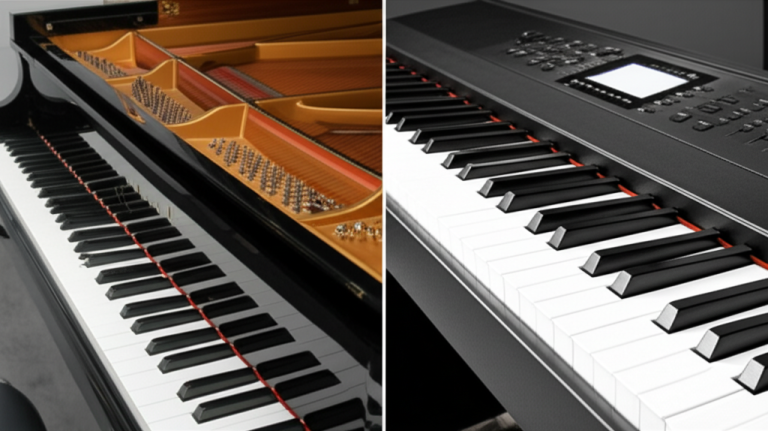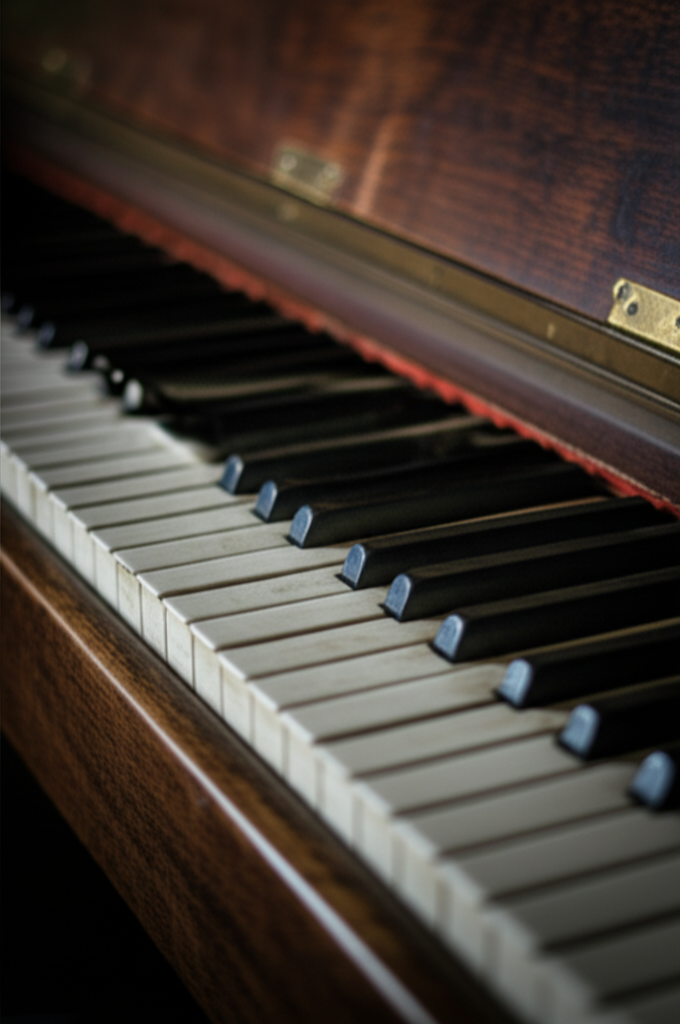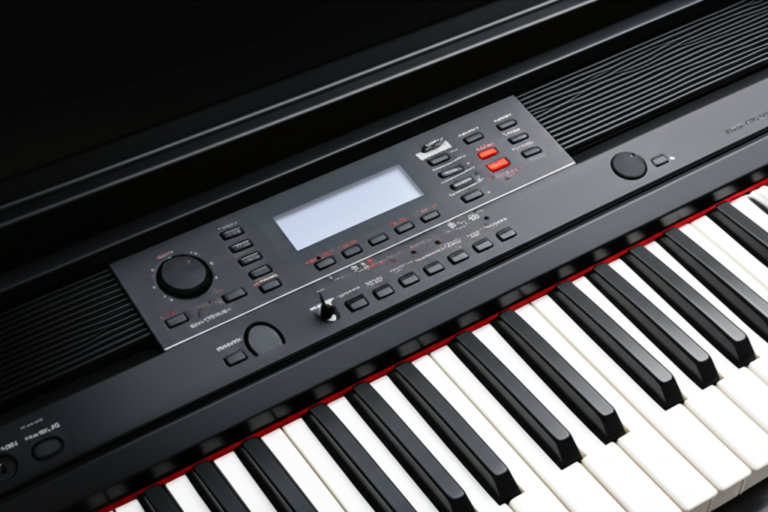Support our educational content for free when you buy through links on our site. Learn more
How to Choose the Best Piano Brand for Your Needs in 2025 🎹
Picture this: you walk into a showroom filled with gleaming pianos, each whispering promises of melodies yet to be played. But how do you decide which brand will truly resonate with your unique style, space, and budget? Choosing the best piano brand isn’t just about picking the fanciest name—it’s about finding an instrument that becomes your lifelong musical companion. From the majestic Steinway grands to the versatile digital wonders of Roland, the options can feel overwhelming. But don’t fret! We’re here to guide you through 10 essential steps that will help you confidently select the perfect piano brand tailored just for you.
Did you know that the right piano can inspire you to practice more, improve faster, and even boost your creativity? Yet, many buyers overlook critical factors like touch sensitivity, maintenance needs, and resale value. Stick with us as we unravel the secrets behind the world’s top piano brands, explore acoustic vs. digital options, and reveal insider tips from seasoned musicians at Piano Brands™. By the end, you’ll be ready to make a choice that strikes all the right chords!
Key Takeaways
- Understand your budget, space, and skill level before diving into brand choices.
- Acoustic, digital, and hybrid pianos each have unique benefits—choose based on lifestyle and goals.
- Top brands like Steinway, Yamaha, Kawai, Roland, and Bösendorfer offer trusted quality across categories.
- Try pianos in person to find your preferred tone and touch.
- Factor in maintenance, features, and resale value for a smart long-term investment.
Ready to explore your options?
- 👉 Shop Steinway & Sons: Amazon | Sweetwater | Steinway Official
- Explore Yamaha Pianos: Amazon | Musician’s Friend | Yamaha Official
- Discover Roland Digital Pianos: Amazon | Sweetwater | Roland Official
Table of Contents
- ⚡️ Quick Tips and Facts
- 🎶 The Grand Symphony of Sound: A Brief History of Piano Innovation
- 🤔 Why Your Piano Choice is More Than Just a Purchase: The Heart of Your Musical Journey
- How to Choose the Best Piano Brand for Your Unique Needs: A Step-by-Step Guide
- Defining Your Budget: The Financial Forte 💸
- Assessing Your Space: The Acoustic Architecture 📏
- Understanding Your Skill Level: From Novice to Virtuoso 📈
- Acoustic vs. Digital vs. Hybrid: The Great Piano Debate 🎹💻
- Sound and Tone: Your Personal Sonic Signature 👂
- Touch and Feel: The Connection to Your Music 🖐️
- Features and Connectivity: Beyond the Keys 🔗
- Brand Reputation and Reliability: Trusting the Masters 🏆
- Maintenance and Longevity: A Long-Term Relationship 🛠️
- Resale Value: Planning for the Future 🔄
- Deep Dive: Exploring Piano Types and Their Best Brands
- 🏆 Top Piano Brands: A Maestro’s Guide to Reputation and Quality
- 🛍️ Where to Find Your Perfect Piano: Navigating the Marketplace
- Beyond the Purchase: Accessories and Ongoing Care
- Conclusion: Your Musical Journey Awaits!
- Recommended Links
- FAQ: Your Burning Piano Questions Answered
- Reference Links
⚡️ Quick Tips and Facts
Welcome to your ultimate piano brand chooser’s cheat sheet! 🎹 Whether you’re a beginner hunting for your first piano or a seasoned pro upgrading your instrument, here are some quick, must-know facts from the Piano Brands™ team to get you started:
- There are hundreds of piano brands worldwide—but only a handful dominate in quality and reputation. Curious how many? Check out our detailed How many brands of piano are there? article.
- Acoustic pianos offer unmatched tone and touch but require space, maintenance, and a bigger budget.
- Digital pianos are versatile, portable, and often budget-friendly, with features like headphone outputs and recording.
- Hybrid pianos blend acoustic feel with digital convenience—perfect for tech-savvy pianists.
- Your skill level, space, and budget are the holy trinity of piano buying decisions.
- Try before you buy! Nothing beats playing the actual instrument to feel its soul.
- Maintenance matters: Acoustic pianos need regular tuning; digital pianos need software updates.
- Brand reputation is your safety net—brands like Steinway, Yamaha, Kawai, Roland, and Bösendorfer have stood the test of time.
- Resale value varies widely—investing in a reputable brand can pay off if you upgrade later.
Ready to dive deeper? Let’s unravel the story behind these majestic instruments and how to pick your perfect match. 🎼
🎶 The Grand Symphony of Sound: A Brief History of Piano Innovation
Before we talk brands, let’s take a quick backstage tour of the piano’s evolution. Understanding the history helps you appreciate why certain brands excel in specific areas.
- Early 1700s: Bartolomeo Cristofori invents the piano, combining harpsichord mechanics with dynamic touch sensitivity.
- 19th Century: The golden age of piano craftsmanship blooms in Europe and America. Steinway & Sons (est. 1853) revolutionizes piano design with the cast-iron frame and overstrung scale.
- 20th Century: Yamaha and Kawai emerge from Japan, blending traditional craftsmanship with industrial innovation.
- Digital Era: Roland, Casio, and Korg pioneer digital pianos in the late 20th century, making piano playing more accessible and portable.
This rich history influences the design, sound, and feel of today’s pianos. For a deep dive, visit our Piano History section.
🤔 Why Your Piano Choice is More Than Just a Purchase: The Heart of Your Musical Journey
Buying a piano isn’t just about owning an instrument—it’s about investing in years of musical joy, growth, and expression. Here’s why choosing carefully matters:
- Emotional connection: The right piano inspires you to practice and create.
- Longevity: A quality piano can last decades, becoming a family heirloom.
- Learning curve: The touch and tone influence your technique development.
- Resale and upgrade path: A good brand holds value and makes future upgrades easier.
As M. Steinert wisely puts it, “An expensive piano may come at a price, but at least you are getting many years of great learning and playing on the keyboard.” Source
How to Choose the Best Piano Brand for Your Unique Needs: A Step-by-Step Guide
Let’s break down the process into manageable steps, so you can confidently pick the brand and model that fits your lifestyle and goals.
1. Defining Your Budget: The Financial Forte 💸
- Set a realistic budget including accessories and maintenance.
- Remember, quality often correlates with price, but some brands offer excellent value.
- Consider financing or used options if new pianos stretch your budget.
- Factor in long-term costs like tuning (acoustic) or software updates (digital).
2. Assessing Your Space: The Acoustic Architecture 📏
- Measure your available room carefully.
- Grand pianos need more space but offer superior sound projection.
- Upright pianos fit smaller spaces but may sacrifice some tonal richness.
- Digital pianos are often compact and portable.
- Consider environmental factors like humidity and temperature.
3. Understanding Your Skill Level: From Novice to Virtuoso 📈
- Beginners may prioritize affordability and ease of use.
- Intermediate players might want better touch sensitivity and tonal variety.
- Advanced pianists often seek premium brands with nuanced action and rich tone.
4. Acoustic vs. Digital vs. Hybrid: The Great Piano Debate 🎹💻
| Type | Pros | Cons | Best For |
|---|---|---|---|
| Acoustic | Authentic tone, expressive touch | Expensive, needs tuning & space | Serious learners, professionals |
| Digital | Portable, affordable, feature-rich | Less authentic feel, speaker quality | Beginners, tech enthusiasts |
| Hybrid | Combines acoustic feel with digital tech | Higher cost, less common | Studio musicians, tech-savvy |
5. Sound and Tone: Your Personal Sonic Signature 👂
- Test pianos in person to find a tone that moves you.
- Brands differ: Steinway offers warm, rich tones; Yamaha is bright and clear; Bösendorfer is lush and orchestral.
- Digital pianos use sampling technology—Roland and Kawai excel here.
6. Touch and Feel: The Connection to Your Music 🖐️
- Weighted keys and graded hammer action are crucial for realistic feel.
- Try different brands to find the key resistance and responsiveness you prefer.
- Digital pianos like the Roland FP-90 offer advanced key actions mimicking acoustic pianos.
7. Features and Connectivity: Beyond the Keys 🔗
- Digital pianos often include MIDI, USB, Bluetooth, and built-in learning tools.
- Acoustic pianos may have silent systems for headphone practice (e.g., Yamaha Silent Piano).
- Consider what tech features matter to you.
8. Brand Reputation and Reliability: Trusting the Masters 🏆
- Established brands have decades or centuries of craftsmanship.
- Yamaha, Steinway, Kawai, Roland, Bösendorfer, and Casio are among the most trusted.
- Read user reviews and expert opinions on platforms like Sweetwater and Musician’s Friend.
9. Maintenance and Longevity: A Long-Term Relationship 🛠️
- Acoustic pianos require regular tuning (2-4 times/year), humidity control, and occasional repairs.
- Digital pianos need software updates and careful handling.
- Hybrid pianos combine both maintenance types.
10. Resale Value: Planning for the Future 🔄
- Premium brands retain value better.
- Well-maintained pianos can be sold or traded up later.
- Digital pianos depreciate faster but can be resold if in good condition.
Deep Dive: Exploring Piano Types and Their Best Brands
Acoustic Pianos: The Timeless Resonance
Grand Pianos: The Concert Hall King 👑
| Brand | Design Rating | Sound Quality | Touch Responsiveness | Durability | Overall Score |
|---|---|---|---|---|---|
| Steinway & Sons | 10 | 10 | 10 | 9 | 9.8 |
| Bösendorfer | 9 | 10 | 9 | 9 | 9.5 |
| Yamaha | 9 | 9 | 9 | 10 | 9.3 |
| Fazioli | 9 | 10 | 9 | 8 | 9.2 |
Steinway & Sons remains the gold standard for concert grands, with unmatched craftsmanship and a rich, singing tone. Bösendorfer offers a unique Viennese sound with extra keys for extended range. Yamaha balances quality and reliability, making it a favorite for both professionals and institutions. Fazioli, the Italian boutique brand, is prized for its clarity and responsiveness.
Upright Pianos: The Versatile Workhorse 🏠
| Brand | Design Rating | Sound Quality | Touch Responsiveness | Durability | Overall Score |
|---|---|---|---|---|---|
| Kawai | 9 | 9 | 9 | 9 | 9.0 |
| Yamaha | 9 | 9 | 8 | 10 | 8.9 |
| Baldwin | 8 | 8 | 8 | 8 | 8.0 |
| Mason & Hamlin | 8 | 9 | 9 | 8 | 8.5 |
Kawai and Yamaha dominate the upright market with consistent quality and excellent touch. Baldwin and Mason & Hamlin offer rich American heritage and warm tones but may require more maintenance.
Digital Pianos: The Modern Maestro’s Companion
Stage Pianos: For the Gigging Musician 🎸
| Model | Design | Sound Quality | Key Action | Features | Overall Score |
|---|---|---|---|---|---|
| Roland RD-2000 | 9 | 10 | 10 | 9 | 9.5 |
| Yamaha CP88 | 9 | 9 | 9 | 8 | 8.8 |
| Korg SV-2 | 8 | 9 | 8 | 8 | 8.3 |
Roland’s RD-2000 is a favorite for its authentic feel and rich sound engine. Yamaha’s CP88 offers excellent playability with a slightly lighter touch. Korg SV-2 shines with vintage sounds and stylish design.
Console Digital Pianos: Home Harmony 🛋️
| Model | Design | Sound Quality | Key Action | Features | Overall Score |
|---|---|---|---|---|---|
| Yamaha Clavinova CLP-785 | 9 | 9 | 9 | 10 | 9.3 |
| Roland HP704 | 9 | 9 | 9 | 9 | 9.0 |
| Kawai CA99 | 9 | 9 | 10 | 8 | 9.0 |
The Yamaha Clavinova series is legendary for home use, blending great sound with advanced features like Bluetooth and lesson modes. Roland and Kawai offer comparable quality with slight variations in feel and interface.
Portable Digital Pianos: Music On-the-Go 🎒
| Model | Weight | Battery Life | Sound Quality | Key Action | Overall Score |
|---|---|---|---|---|---|
| Roland FP-30X | 14kg | No | 9 | 9 | 8.8 |
| Yamaha P-125 | 12kg | No | 8 | 8 | 8.0 |
| Casio Privia PX-S1000 | 11kg | Yes | 7 | 7 | 7.5 |
Roland FP-30X is praised for its realistic feel and sound in a compact form. Yamaha’s P-125 is reliable and affordable. Casio’s PX-S1000 is ultra-portable with battery power, great for casual players.
Hybrid Pianos: Blending the Best of Both Worlds
| Brand/Model | Acoustic Feel | Digital Features | Sound Quality | Price Range | Overall Score |
|---|---|---|---|---|---|
| Yamaha AvantGrand N3X | 10 | 9 | 10 | High | 9.7 |
| Kawai Novus NV10 | 10 | 9 | 9 | High | 9.5 |
| Roland LX708 | 9 | 10 | 9 | Mid-High | 9.3 |
Hybrid pianos like Yamaha AvantGrand and Kawai Novus combine real wooden keys and acoustic actions with digital sound engines, offering the best of both worlds for serious pianists who want flexibility.
🏆 Top Piano Brands: A Maestro’s Guide to Reputation and Quality
Acoustic Titans: Steinway & Sons, Yamaha, Kawai, Bösendorfer, Baldwin, Mason & Hamlin
- Steinway & Sons: The benchmark for concert grands, handcrafted with over 12,000 parts. Known for rich, powerful tone and responsive action. Steinway Official
- Yamaha: Offers a wide range from beginner uprights to concert grands. Known for reliability and bright, clear sound. Yamaha Official
- Kawai: Innovative with Millennium III carbon fiber actions, offering smooth touch and warm tone. Kawai Official
- Bösendorfer: Austrian craftsmanship with a unique tonal palette and extended keyboard range. Bösendorfer Official
- Baldwin: Classic American brand with warm tone, though less common today.
- Mason & Hamlin: Boutique American pianos with rich tone and solid construction.
Digital Innovators: Roland, Yamaha, Kawai, Korg, Casio
- Roland: Known for cutting-edge digital technology and authentic key actions. Roland Official
- Yamaha: Leading in digital piano sales with Clavinova and portable models.
- Kawai: Combines acoustic expertise with digital innovation.
- Korg: Offers stylish, feature-rich stage pianos.
- Casio: Affordable, portable digital pianos with surprising quality.
🛍️ Where to Find Your Perfect Piano: Navigating the Marketplace
Authorized Dealers: The Gold Standard for New Instruments 💎
- Buying through authorized dealers ensures warranty, expert advice, and after-sales service.
- Many brands offer demo rooms and trial periods.
- Dealers often provide financing options.
The Used Market: Hidden Gems and Smart Savings 💰
- Buying used can save money but requires expert inspection.
- Always hire a registered piano technician for appraisal.
- Check for warranty transfer and maintenance history.
Online Retailers: Convenience at Your Fingertips 🌐
- Platforms like Amazon, Sweetwater, and Musician’s Friend offer wide selections.
- Beware of shipping damage and lack of in-person trial.
- Read reviews carefully.
Piano Technicians and Appraisals: Your Expert Allies 🧑🔧
- A qualified technician can assess condition, recommend brands, and help with maintenance.
- Find technicians through the Piano Technicians Guild (PTG).
Beyond the Purchase: Accessories and Ongoing Care
Essential Accessories: What Else Do You Need? 💡
- Piano bench: Adjustable height for comfort.
- Metronome: For timing practice.
- Piano cover: Protects from dust and spills.
- Humidity control: Especially for acoustic pianos; consider a humidifier or dehumidifier.
- Headphones: For silent practice on digital/hybrid pianos.
Tuning and Maintenance: Keeping Your Piano in Perfect Pitch 🎶
- Acoustic pianos need tuning 2-4 times per year.
- Digital pianos require software updates and occasional key cleaning.
- Regular technician visits extend lifespan.
Environmental Considerations: Protecting Your Investment 🌡️
- Avoid placing acoustic pianos near heaters, windows, or direct sunlight.
- Maintain stable humidity (40-50%) to prevent wood cracking or swelling.
- Digital pianos prefer dry, dust-free environments.
👉 CHECK PRICE on:
- Steinway & Sons: Amazon | Sweetwater | Steinway Official
- Yamaha Pianos: Amazon | Musician’s Friend | Yamaha Official
- Roland Digital Pianos: Amazon | Sweetwater | Roland Official
- Kawai Pianos: Amazon | Musician’s Friend | Kawai Official
For more detailed brand guides and comparisons, explore our Piano Brand Guides and Piano Comparison categories. Ready to make your choice? We’re here to help every step of the way! 🎹✨
Conclusion: Your Musical Journey Awaits!
Choosing the best piano brand for your needs is an exciting journey—one that blends your personal taste, budget, space, and musical ambitions. Whether you lean toward the timeless resonance of an acoustic Steinway or Bösendorfer, the versatility of a Yamaha or Kawai upright, or the cutting-edge features of a Roland or Casio digital piano, the key is to find an instrument that inspires you to play and grow.
We’ve walked through the essentials: from understanding your budget and space to exploring the strengths and quirks of acoustic, digital, and hybrid pianos. Remember, there’s no one-size-fits-all—your perfect piano is the one that feels like an extension of your musical soul.
If you’re still on the fence, here’s a quick recap:
- Acoustic pianos offer unmatched tone and touch but require space and maintenance.
- Digital pianos provide convenience, features, and portability, great for beginners and tech lovers.
- Hybrid pianos blend the best of both worlds for serious players seeking flexibility.
Our personal experience at Piano Brands™ tells us: try before you buy, trust reputable brands, and invest in quality maintenance. Your piano will reward you with years of musical joy, creativity, and maybe even a few standing ovations. 🎶
Ready to find your perfect piano? Dive into our recommended links below and start your musical adventure today!
Recommended Links
👉 Shop Top Acoustic and Digital Piano Brands:
- Steinway & Sons: Amazon | Sweetwater | Steinway Official
- Yamaha Pianos: Amazon | Musician’s Friend | Yamaha Official
- Roland Digital Pianos: Amazon | Sweetwater | Roland Official
- Kawai Pianos: Amazon | Musician’s Friend | Kawai Official
- Bösendorfer: Bösendorfer Official
Must-Read Books on Piano Buying and Playing:
- The Piano Book by Larry Fine — Amazon Link
- Piano Maintenance and Tuning by Stefan Knüper — Amazon Link
- How to Choose a Piano by M. Steinert — Amazon Link
FAQ: Your Burning Piano Questions Answered
What are the key differences between acoustic and digital pianos that I should consider when choosing a brand?
Acoustic pianos produce sound through hammers striking strings, offering a rich, organic tone and nuanced touch. They require regular tuning and maintenance, need more space, and tend to be more expensive upfront. Brands like Steinway & Sons, Bösendorfer, and Yamaha excel here.
Digital pianos generate sound electronically, often using high-quality samples of acoustic instruments. They are more portable, require less maintenance, and come with features like headphone outputs and recording capabilities. Brands such as Roland, Casio, and Yamaha lead this segment. The feel can vary, but many models now offer graded hammer action to mimic acoustic touch.
Choosing depends on your priorities: if you want authentic sound and feel and have space and budget, acoustic is ideal. If you need flexibility, portability, or practice silently, digital is better.
How do I determine my budget for a piano and what features can I expect at different price points?
Your budget should include not just the piano but also accessories, delivery, and maintenance.
- Entry-level (budget-conscious): Expect basic digital pianos or smaller uprights with decent sound and touch. Brands like Casio Privia or Yamaha P-125 offer great value.
- Mid-range: Better key action, richer sound samples, and more features. Digital pianos like Roland FP-30X or uprights from Kawai fit here.
- High-end: Premium acoustic grands and uprights with handcrafted quality, superior tone, and longevity. Brands include Steinway, Bösendorfer, and Fazioli.
Remember, a higher price often means better craftsmanship, durability, and resale value.
What are the most reputable piano brands for beginners, and which ones are best suited for advanced players?
- Beginners: Look for brands offering reliable, affordable instruments with good touch and sound. Yamaha, Kawai, Casio, and Roland are excellent choices.
- Advanced players: Seek brands with superior craftsmanship and nuanced tone. Steinway & Sons, Bösendorfer, Fazioli, and Kawai’s high-end models are preferred.
Beginners benefit from digital pianos with learning features, while advanced players often prefer acoustic or hybrid models.
Are there any specific features or technologies that I should look for in a piano brand to ensure it meets my long-term playing needs?
- Weighted keys and graded hammer action: Essential for developing proper technique.
- Polyphony: For digital pianos, at least 64-note polyphony is recommended; 128 or more is better for complex pieces.
- Connectivity: USB/MIDI and Bluetooth allow integration with apps and recording.
- Silent practice options: Useful in acoustic pianos for quiet play.
- Durability and warranty: Look for brands with strong support and long warranties.
Brands like Roland and Yamaha lead in integrating these technologies.
How important is maintenance and tuning when choosing between piano brands?
Maintenance is crucial, especially for acoustic pianos. Regular tuning (2-4 times per year) keeps the instrument sounding its best. Some brands, like Yamaha and Kawai, are known for stability and require less frequent tuning. Digital pianos need less maintenance but benefit from software updates and careful handling.
Can I trust buying a used piano, and how do I assess its quality?
Buying used can be smart financially but comes with risks. Always:
- Hire a registered piano technician for inspection.
- Check for structural damage, soundboard cracks, and key action wear.
- Verify maintenance history and warranty status.
- Consider brands with strong resale value like Steinway or Yamaha.
Reference Links
- Steinway & Sons Official
- Yamaha Pianos Official
- Roland Digital Pianos Official
- Kawai Pianos Official
- Bösendorfer Official
- Piano Technicians Guild (PTG)
- How To Choose The Right Piano – Liberty Park Music
- M. Steinert Piano Buying Guide
- Top 10 World’s Best Piano Brands – MUEX
We hope this guide has illuminated your path to piano bliss! Remember, the right piano brand is the one that sings to your heart and fits your lifestyle. Happy playing! 🎹✨





